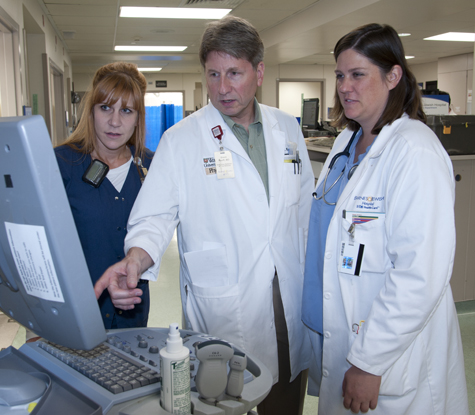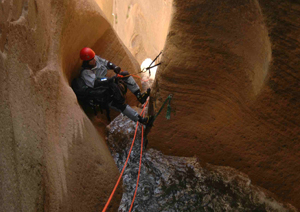
In his free time, Brent Ruoff, MD, often rappels hundreds of feet in the darkness, swims in frigid water and climbs massive boulders with only hooks, ropes and other simple devices.
Although canyoneering may sound terrifying to some, for Ruoff, it’s recreation.
Ruoff, associate professor and chief of the Division of Emergency Medicine at Washington University School of Medicine in St. Louis, has explored canyons on the Colorado Plateau and across the desert Southwest.
Years ago, he and a friend took the wrong route while exploring the Right Fork of North Creek Canyon in Zion National Park. Halfway through the fork, they discovered a dry fall that was longer than the rope they were carrying, and they had no anchor from which to rappel. In a jam, they jury-rigged ropes and other equipment they had on hand to safely descend.
Ruoff’s quick thinking and calm demeanor have likely saved his own life in the wilderness, and he draws on these same skills when treating patients who arrive with shattered bones, gunshot wounds or head injuries.
“He has the patience of Job and is the most even-tempered person I have ever worked with,” says Lawrence Lewis, MD, associate professor of emergency medicine. “He has been this way for the quarter of a century that I have had the honor and pleasure of working with him.”
The physicians who work in the Division of Emergency Medicine also herald Ruoff’s work ethic, selflessness and leadership skills.
“Brent is the most amazing boss out there,” says S. Eliza Halcomb, MD, assistant professor of emergency medicine. “I’ve worked in different jobs and have yet to find a leader as supportive and encouraging as he is. He’s patient, fair and always willing to listen.”

His colleagues say Ruoff embodies the phrase to “lead by example” and works behind the scenes for the betterment of the entire division.
“Brent actively seeks opportunities to advance the careers of others and gauges his own success as division chief by the success of everyone around him,” says David Tan, MD, assistant professor of emergency medicine. “It’s no wonder that everyone wants to work for him.”
Discovering emergency medicine
Ruoff grew up in St. Joseph, Mo., the youngest in a family of three children. His father was an electrical estimator.
In high school during the early 1970s, Ruoff excelled in science and math courses and qualified as a National Merit Finalist. At the time, he considered becoming an endocrinologist.
He then studied chemistry at Graceland College, a small school in Lamoni, Iowa, sponsored by the Community of Christ Church. Ruoff spent a lot of time on the volleyball court, a popular pastime there, but still graduated with a chemistry degree in only three years.
“I liked tinkering in the lab, but I wasn’t sure if I wanted to be a scientist,” he says.
In the end, Ruoff chose to become a physician. Some of his good friends and his brother were going to medical school. Ruoff followed his brother to Saint Louis University School of Medicine, where they shared an apartment.
After graduating from medical school in 1981, Ruoff completed an internal medicine residency at Saint Louis University Medical Center. He then became a chief medical resident at St. Louis County Hospital and stayed on following his residency as an internal medicine faculty member. He discovered his passion for emergency medicine while serving as medical director of the hospital’s small emergency room.
“I’ve been steered a lot in my professional path by circumstances that occurred in my environment,” Ruoff says.
St. Louis County Hospital closed, and Ruoff became assistant director of the SLU Hospital Emergency Department and a faculty member of the Division of Emergency Medicine.
At the time, Lewis was the director of the SLU Hospital Emergency Department. When he was hired by Washington University School of Medicine in 1994 to establish a Division of Emergency Medicine, Lewis brought Ruoff and Rosanne Naunheim, MD, now associate professor of emergency medicine, with him.
Faculty in the new division started a four-year residency training program in 1997. The division now also offers fellowships in emergency ultrasound, emergency medical services and toxicology. It has grown to include more than 40 faculty physicians who treat patients in the emergency departments of Barnes-Jewish, St. Louis Children’s and Barnes-Jewish West County hospitals.
Working side by side
Lewis stepped down from division chief in 2004, and Ruoff was named interim chief and later division chief.

In addition to his administrative tasks, Ruoff guides residents in the nuances of emergency medicine, with an emphasis on emergency radiology. The rest of his time is focused on patients.
Ruoff’s willingness to work side by side with his faculty is another aspect that makes him a great boss, Tan says.
“He works nights, weekends and holidays, just like the rest of us, which gives him an inside perspective into what’s going on in the emergency departments as well as our academic division,” Tan says.
Despite the chaotic, over-the-top scenes in the ER hit TV series, Ruoff says that many patients visit an emergency department (ED) for one of three ailments: chest pain, abdominal pain or weakness. But 20 percent of patients come into the ED facing serious life or limb-threatening situations.
Those patients weigh heavily on Ruoff.
Telling the family of a young person that their loved one has died is one of the most trying parts of his job, he says.
“We couldn’t resuscitate a man in his 40s who had a heart attack, and it was so hard to tell his wife and two young children that he didn’t make it,” Ruoff says. “I also remember telling the parents of a 30-year-old man with a congenital heart problem that he had died. They knew his death was inevitable, but it was very difficult to have that conversation.”
Just as he pushes himself mentally and physically in canyoneering, Ruoff does the same when he faces clinical challenges in the ED.
“If someone arrives alive, I consider it a failure if we can’t keep them alive,” he says.
Fast facts about Brent Ruoff
Title: Associate professor and chief of the Division of Emergency Medicine
Pastimes: Ruoff has been a volunteer coach for many years with the women’s volleyball team at WUSTL. He doesn’t claim any credit, but the team has won nine national championships since he started coaching. Ruoff attends practice once a week and sometimes travels with the team.
Family: Ruoff and his wife, Kim, an aesthetician, raise dogs and are involved in fox terrier rescue.